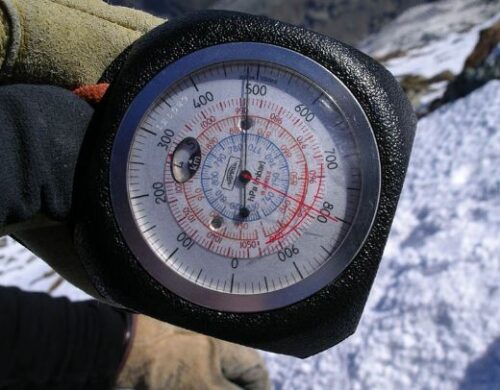In this guide, we will explore the best altimeters on the market today.
An altimeter is an indispensable tool for anyone involved in aviation, mountaineering, or certain water sports. It measures altitude, providing critical information about your elevation above sea level. With advancements in technology, these handy tools are more precise, user-friendly, and versatile than ever before.
Whether you are a pilot navigating the skies, a hiker conquering peaks, or an adventurer seeking new heights, choosing the right altimeter can enhance your experience and ensure your safety. These devices come in different types, including barometric, GPS, and radar altimeters, each offering unique advantages based on the application.
The best altimeters are distinguished by their accuracy, reliability, durability, and additional features like weather forecasting and route tracking. We have scoured the market and compiled a list of the best altimeters, highlighting their specifications, pros, and cons to help you make an informed decision tailored to your individual needs. But first, here are the features that make a great altimeter.
What Makes a Great Altimeter?
A great altimeter has several key characteristics that ensure accuracy, reliability, and usability. These features include:
- High-Resolution Measurements: The ability to measure altitude changes accurately and precisely is critical. This means having a high-resolution sensor that can detect even small changes in altitude.
- Reliable Sensors: Barometric sensors, which measure air pressure, are commonly used. They should be calibrated correctly to provide accurate readings.
- Robust Construction: A great altimeter should be built with robust features to withstand harsh conditions, including extreme temperatures, moisture, and physical impact.
- Water Resistance: For outdoor activities, water resistance or even waterproofing is essential for the best altimeters.
- User-Friendly Interface: Moreover, a great altimeter should have an intuitive interface, with clear displays and easy-to-navigate menus.
- Long Battery Life: The altimeter should have a long battery life to avoid running out of power during critical moments, Especially for outdoor and aviation use.
- Logging and Tracking: Last but not least, a great altimeter should have the ability to log and track altitude changes over time. This feature is beneficial for activities like hiking or aviation.
Best Altimeters
1) ZIPLEVEL PRO-2000 High Precision Altimeter
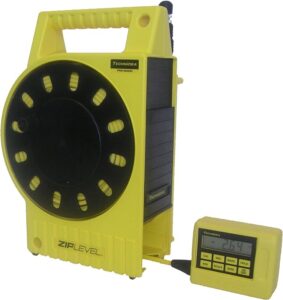
Specifications
- Weight: 12 Pounds
- Water Resistance Level: IP54
- Power Source: Battery Powered
- Voltage: 9 Pounds
- Product Dimensions: 10.5″L x 7.5″W x 16″H
- Material: Plastic
- Operating Temperature Range: -22°F to +158°F (-30°C to +70°C)
- Storage Temperature Range: | -40°F to +158°F (-40°C to +70°C)
The ZIPLEVEL PRO-2000 High Precision Altimeter is the best altimeter on the market, it features a full vertical range, predicts graded elevation without tabulation or math, has 16 Powerful built-in functions, and is pressurized for bubble-free paper-thin precision. It also stands out with its user-friendly interface and robust build quality.
The device eliminates the need for traditional laser levels and tripods, simplifying the leveling process with its innovative design. It features a highly sensitive measurement system that can detect minute changes in elevation, making it ideal for a wide range of applications including construction, landscaping, and surveying.
Furthermore, it is easy to set up, with a clear digital display that provides precise readings. Regarding construction, its durability and portability are hard to beat. Encased in a rugged housing, it is built to withstand the rigors of fieldwork, including exposure to harsh weather conditions. Besides, the integrated hose reel and lightweight design make it easy to transport and deploy at various job sites.
The device also includes useful features such as a zero-setting function, memory hold for recording measurements, and a built-in calibration check to ensure consistent accuracy. Over and above that, the battery life is impressive, providing extended operational time between charges.
Pros
- High precision. it allows paper-thin measurements to 0.005” (0.1mm) in HP range.
- Scale for readings in fractional or decimal inches, feet or meters.
- Mark. Lets you sound leveling or limit tones to supplement the display.
- Elevation. For setting readings in sea level elevation at a known survey monument.
- Carry. Allows unlimited vertical and horizontal ranges without tabulation or math.
- Zero. Sets display to read zero at a reference – the same as setting the target on a rod
Cons
- Not water immersible
2) Jolly Logic AltimeterTwo
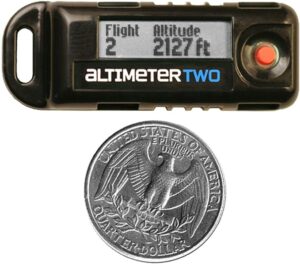
Specifications
- Item Weight: 0.24 Ounces
- Power Source: Battery Powered
- Speed Measurement: MPH or KPH
- Product Dimensions: 0.57 x 0.71 x 1.93″ (14.5 x 18 x 49mm)
- Material: Plastic
- Peak Altitude: 29,500 feet (9,000 meters)
The Jolly Logic AltimeterTwo is an exceptional tool for model rocketry enthusiasts, providing precise and comprehensive flight data in a remarkably compact form.
This altimeter stands out due to its versatility and ease of use. Equipped with an accelerometer and a barometric sensor, it captures 10 different flight parameters, including peak altitude, maximum speed, and flight duration.
The data is displayed on a crisp, easy-to-read screen, which is a significant upgrade from previous models that required connecting to a computer for data retrieval.
This feature makes the altimeter not only user-friendly but also practical for on-the-go analysis during launches. Besides, the small size allows it to fit into even the smallest model rockets without adding significant weight.
In terms of durability and reliability, the Jolly Logic AltimeterTwo excels. Its robust design ensures it can withstand the rigors of multiple launches and landings. The battery life is impressive, offering up to several months of usage on a single charge, depending on the frequency of launches.
Additionally, the altimeter’s ability to store and recall data from multiple flights is invaluable for hobbyists who wish to track the performance of their rockets over time.
Above all, the device’s calibration process is straightforward, and it offers a high level of accuracy, often within a few feet for altitude and a few miles per hour for speed.
Pros
- Impressive battery life offering up to several months of usage on a single charge
- Compact, lightweight, and portable design
- Great value for the price
- The calibration process is straightforward, and it offers a high level of accuracy
Cons
- Designed for rocket use only
3) Sun Company AltiLINQ – Dashboard Altimeter and Barometer
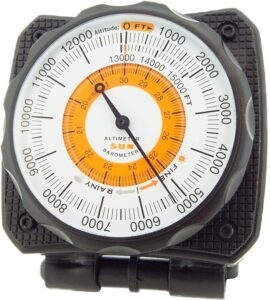
Specifications
- Item Weight: 4 Ounces
- Power Source: Battery-Free
- Altitude: 0-15000 feet
- Product Dimensions: 6.97 x 3.74 x 1.3 inches
- Material: Plastic
As one of the best altimeters, the Sun Company AltiLINQ Dashboard Altimeter and Barometer is a robust and reliable instrument that serves outdoor enthusiasts and professionals alike. Designed for easy dashboard mounting, this device provides real-time altitude and atmospheric pressure readings.
The altimeter offers a wide range of up to 20,000 feet, ensuring accuracy even at high altitudes. The clear, easy-to-read dial is backlit, making it convenient to use in low-light conditions. Moreover, its mechanical design means it doesn’t rely on batteries, enhancing its dependability in remote locations where power sources are scarce.
In addition to its practical functionality, the AltiLINQ stands out for its durability and aesthetic appeal. The rugged construction is designed to withstand harsh environmental conditions, including extreme temperatures and moisture, which is a testament to its build quality. Furthermore, the sleek, modern design complements any vehicle dashboard, adding a touch of sophistication.
Pros
- Consistent performance and high accuracy even at high altitudes
- Dual functionality as both an altimeter and barometer
- Clear, easy-to-read dial is backlit and is convenient to use even in low-light conditions
- Rugged construction to withstand harsh environmental conditions
- Dependability in remote locations as it is not battery-powered
Cons
- Hard to read
4) ZIPLEVEL PRO-2000B High Precision Altimeter
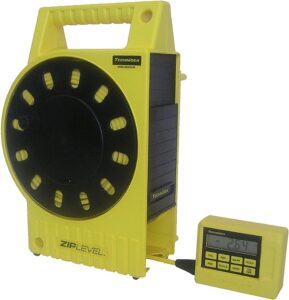
Specifications
- Item Weight: 9.13 pounds
- Measurement Accuracy: 0.005
- Battery Cell Type: Alkaline
- Voltage: 9 Volts
- Power Source: Battery-Powered
- Warranty: 1-year warranty against manufacturer defects for parts and labor
- Product Dimensions: 10.5 x 7.5 x 16 inches
- Material: Plastic
If you are looking for a high-precision altimeter that simplifies the complexities of elevation measurement, the ZIPLEVEL PRO-2000B is an investment that delivers both efficiency and accuracy. It is a standout tool for professionals in construction, surveying, and landscaping, providing unparalleled precision and ease of use.
One of its most impressive features is its ability to measure elevation differences with extreme accuracy, down to 0.005 inches. This high level of precision is crucial for tasks that demand exact leveling and height measurements, such as foundation work or grading. Besides, it does not require a clear line of sight, which makes it incredibly versatile in complex or obstructed environments.
The altimeter also boasts a substantial range of up to 100 feet in each direction from the base unit, making it suitable for large-scale projects. In addition to its technical capabilities, it is designed with user convenience in mind. It is self-calibrating, saving valuable time and reducing the potential for human error during setup.
Moreover, the ergonomic design includes a digital readout that is easy to read even in bright sunlight, and the controls are intuitive, allowing users to quickly master the device without extensive training. The unit is also durable and built to withstand the rigors of job sites with a weather-resistant construction.
Pros
- Well-built to withstand the rigors of job sites with a weather-resistant construction
- Incredibly versatile and easy to use
- 16 Powerful built-in functions
- 40 feet vertical range and 50-foot circle and unlimited differential leveling
- Self-calibrating to save valuable time and reduce the potential for human error during setup
Cons
- None
5) Sun Company Altimeter 203 – Battery-Free Altimeter and Barometer
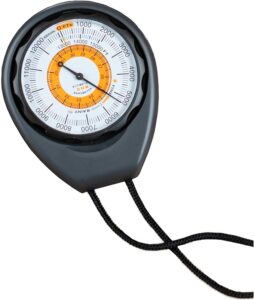
Specifications
- Item Weight: 0.15 Ounces
- Power Source: Battery-Powered
- Altitude: 0-15,000 feet
- Product Dimensions: 1″D x 2.3″W x 1.5″H
- Material: Plastic
- Special Feature: Thermometer, Barometer
The Sun Company Altimeter 203 is an innovative piece of outdoor equipment that stands out in the market for its battery-free functionality. It is optimized for versatility so it is an ideal choice for hikers, climbers, and outdoor enthusiasts.
This altimeter and barometer combo measures altitude changes based on atmospheric pressure, providing accurate readings without the need for batteries. Its build quality is robust and designed to withstand harsh outdoor conditions. Additionally, the device is compact and lightweight, ensuring it can be easily attached to a backpack or belt loop without adding unnecessary bulk.
The barometer feature of the Altimeter 203 is particularly useful for predicting weather changes, offering users valuable insights into impending storms or fair weather, which is crucial for planning and safety in the wilderness. The altimeter’s accuracy is commendable, with readings that are generally within a few meters of GPS-based devices, providing reliable data for navigation and altitude tracking.
Moreover, the device includes a calibration feature that allows users to set the current altitude manually, ensuring accuracy after significant weather changes or elevation shifts. Its analog display is also easy to read, with clear markings and a durable, scratch-resistant face.
Pros
- Easy to read display
- Reliable, battery-free design
- Rugged ABS case keeps altimeter protected
- Lightweight, compact, and ultra-portable
Cons
- Accuracy issues
6) Sun Company Altimeter 202 – Battery-Free Altimeter and Barometer
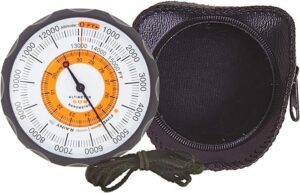
Specifications
- Item Weight: 0.01 Ounces
- Power Source: Battery-Powered
- Altitude: 0-15,000 feet
- Product Dimensions: 2.3 x 1 x 1.5 inches
- Material: Plastic
- Special Feature: Thermometer, Barometer
Lastly in our list of the best altimeters, we have the Sun Company Altimeter 202, a remarkable device that stands out due to its battery-free operation. It is a reliable, eco-friendly, and user-friendly tool for outdoor enthusiasts.
The altimeter and barometer combination is designed with precision in mind, offering accurate readings up to 15,000 feet. The use of an aneroid barometer mechanism ensures that users can rely on its measurements without the need for frequent recalibrations or battery replacements. This is particularly beneficial for long trips or remote adventures where access to power sources is limited.
Furthermore, the device is constructed with durability in mind, featuring a rugged, weather-resistant casing that can withstand the harsh conditions typically encountered during hiking, climbing, or other outdoor activities. Regarding portability, the compact and lightweight design make it convenient to carry without adding significant weight to your gear.
Functionality is another area where the Altimeter 202 excels. The clear, easy-to-read dial displays altitude in both feet and meters, providing versatility for users worldwide. Additionally, the barometer function helps predict weather changes, a crucial feature for those planning extended outdoor excursions.
Pros
- Simple analog design which eliminates the risk of digital malfunctions
- Clear, easy-to-read dial displays altitude in both feet and meters
- Adjustable dial for highly accurate readings
- Reliable, battery-free design
- Light, compact, and convenient to carry without adding significant weight to your gear
Cons
- The bezel turns too quickly
Read Also:
Factors to Consider when Choosing the Best Altimeters
Choosing the best altimeter depends on your specific needs and activities, such as hiking, mountaineering, skydiving, or flying. Here are some key factors to consider when selecting an altimeter:
Type of Altimeter
Altimeters come in different types with the common ones being barometric, GPS, and combination altimeters.
- Barometric Altimeters: Measure altitude based on atmospheric pressure. Ideal for outdoor activities like hiking and mountaineering.
- GPS Altimeters: Use satellite signals to determine altitude. Great for precise altitude readings in various activities, including aviation and outdoor sports.
- Combination Altimeters: Utilize both barometric pressure and GPS data for more accurate readings.
Accuracy and Precision
Look for an altimeter with high accuracy and minimal error margins. Barometric altimeters should have reliable pressure sensors, while GPS altimeters should have multi-band reception for better precision.
Durability and Build Quality
The next important thing to consider is durability and build quality. Choose an altimeter that is rugged and durable, especially if you plan to use it in harsh environments. Water resistance and shockproof features are beneficial.
Battery Life
Most of the best altimeters are battery powered. When making your selection, consider the battery life of the device. For extended outdoor trips, long battery life or the ability to replace batteries easily is crucial.
Display and Readability
Display and readability can make or break an altimeter. So, ensure the altimeter you choose to get has a clear and easy-to-read display. Backlighting is useful for easy reading in low-light conditions.
FAQs
- Are altimeters waterproof?
Not all altimeters are waterproof. If you need an altimeter for water-based activities, make sure to choose one that is specifically designed to be waterproof or water-resistant.
- How often should I calibrate my altimeter?
The frequency of calibration depends on the type of altimeter and its usage. Barometric altimeters may need periodic recalibration to account for changes in atmospheric pressure, while GPS altimeters typically do not require calibration.
- How does an altimeter work?
Altimeters measure altitude by detecting changes in air pressure. As altitude increases, atmospheric pressure decreases. Altimeters use this principle to determine altitude by comparing the current air pressure to a known standard pressure.
Final Words
In conclusion, there are plenty of great altimeters out there and your ideal model largely depends on your budget and intended use. Ensure that you get an altimeter with with high accuracy and minimal error margins. It is also important to get a product that is well-made with durability and ease of use in mind.
